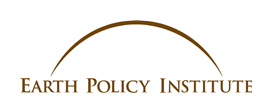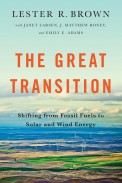Tuesday, August 13, 2013
While summer is a time tending to be a bit more leisurely, it has been the opposite for the Institute. First, we received copies of the Swedish edition of Full Planet, Empty Plates. Thanks to Doris and Lars Almstrom for their tireless efforts!
On June 24, Lester headed to England where he gave a talk at Oxford hosted by the School of Geography and the Environment. The next day he was in London to give a keynote address at the Agriculture Investment Summit and also did a Q&A on his book, Full Planet, Empty Plates.
While in London, he met with a few reporters, including John Vidal, the environment editor for the Guardian/Observer. They talked about food security and water shortages. Lester had been working on an article about water scarcity, a copy of which he gave to John. Not only did John write two articles based on their conversation, but he posted Lester’s article on the Observer’s website during our Fourth of July holiday. It was entitled "The Real Threat to our Future is Peak Water."
On returning to the office Monday, July 8, we fielded a number of media interviews and found an Internet abuzz with the news. We quickly posted the article on our website under the title “Peak Water: What Happens When the Wells Go Dry?” and sent it out on our listserv. The Guardian/Observer has been called the world’s most read small paper and it certainly deserves it. Its coverage of environmental issues is superb!
Meanwhile, Janet Larsen was making news with her two Updates on bicycle sharing. She compiled an extensive database of bike-sharing programs throughout the world, a collection that has been used by cities exploring setting up their own programs. But it was the Update she co-authored with Matt Roney on farmed fish overtaking beef production that really attracted attention. Between she and Matt, they gave interviews for two Canadian Broadcasting television stations, New Scientist, CTV (China), Radio New Zealand, and Australia Broadcasting, Bloomberg, and The Economist. Plus there were dozens of stories in the media.
And when the news about the first lab-grown hamburger hit, NPR called for our take on it. Janet weighed in for The Salt.
Meanwhile Lester gave two talks in the DC area: one to the Cedar Lane Unitarian Church and the other at the joint annual meeting of the Agricultural & Applied Economics Association and the Canadian Agricultural Economics Society.
We also hosted a day of filmed interviews for a documentary by Marilyn and Hal Weiner, the producers who did the Plan B documentary that haas bee aired on PBS and in screenings around the world. Their new film is entitled Extreme Realities and explores the links between climate change, extreme weather, and threats to our nation's security. This will be a new episode in the PBS prime-time environmental series, Journey to Planet Earth.
But, don’t be lulled into thinking that’s all that we’ve been doing. We have a big announcement coming that we think you will all enjoy.
Cheers,
Reah Janise Kauffman
Page 1 of 1 pages


